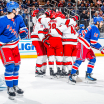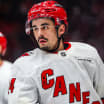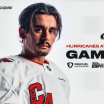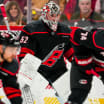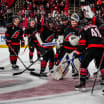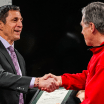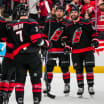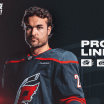RALEIGH, NC. -Over the course of the Carolina Hurricanes 2021-22 season the television camera would pan across the team's bench and the man largely responsible for the team's defensive structure, play and penalty kill prowess would appear on screen. Invariably Tim Gleason would be impeccably dressed, face betraying nothing, stoic as though he had somehow wandered by mistake from his real job as a hedge fund manager into the din and fray that is NHL hockey.
That's of course not at all what has happened. In fact, it's hard to imagine Gleason being anywhere else right now.
Burnside: Gleason's First Season Behind The Bench
"If you talk to a certain player prior about trying to work on something and they go do it, that's what it's all about. It's just helping the player, being there for the player."
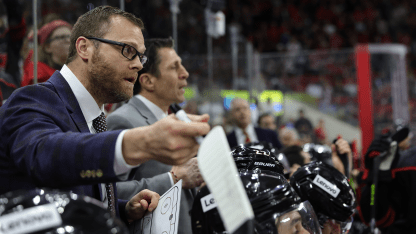
But there's also no doubt that his presence behind the bench is equal parts total outlier and critical piece.
Gleason recalls his first taste of life in North Carolina. A native of Clawson, Michigan, Gleason was the 23rd overall pick of the Ottawa Senators in the 2001 draft. After being traded to Los Angeles, Gleason and Eric Belanger were acquired just before the start of the 2006-07 season by Carolina for Jack Johnson and Oleg Tverdovsky.
"It was a bit of a surprise. I think it was training camp the year after we won, they won the Cup here," Gleason recalled. "I got traded with Eric Belanger so that was helpful at the time. It was a totally different lifestyle change especially, heck it was about 15 years ago at this point, from L.A. to here. There are a lot of trees here. We were passing the cow fields on the way to the rink, so we were like, where are we? So that was kind of a big adjustment."
Gleason spent the next seven and a half seasons with the Hurricanes before being dealt to Toronto in early 2014.
He and head coach Rod Brind'Amour sometimes joke about how Gleason felt that Brind'Amour, who was the Hurricanes captain at the time of Gleason's arrival, was a little aloof.
"He always jokes that I didn't talk to him for like three months," Brind'Amour said with a laugh. "I go, 'yeah you've got to show me what you were about before I was going to waste my time.'"
"I said, 'heck I didn't even know if you knew my name the first little bit,'" Gleason added. "He goes, 'I knew you, I just wanted to see how you adapted' or whatever. I go 'geez nothing wrong with saying hi.'"
"He's different now," Gleason added with his own chuckle. "I talk to him all the time."
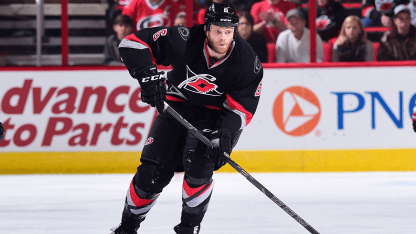
Gleason spent half a season in Toronto, returned to Carolina, and then joined Washington at the 2015 trade deadline before he retired at the end of that season.
Like many former Hurricanes, Gleason and his wife and their three kids, now 15, 11, and 10, set up shop in Raleigh.
It wasn't a decision influenced by the possibility of a future role with the team. In fact, pretty much the opposite.
"When I was done playing? Actually, you know what I've got to be honest with you. When I was done, I was done," Gleason said. "I was gone for about two years actually. Kind of got into some skating on the side with kids and some training, off-ice training, things like that. Just for about two years or so."
Then one day former assistant GM Brian Tatum called asking if Gleason was interested in rejoining the Hurricanes in a development role.
"I'm like, geez, I never even thought about it. I said, 'sure I'm interested.' That's kind of how it kicked off," Gleason, 39, said.
There are some skills that overlap between being a development coach and being an actual hockey coach. There is video to watch. There are conversations with players and their coaches either at the junior, minor pro, collegiate, or European level. There is some travel going to see those prospects, especially in North America.
Then, during the 2019-20 season Ryan Warsofsky, now the head coach of the Hurricanes' top affiliate in Chicago, was away from the Hurricanes' then AHL affiliate in Charlotte for a few games, so Gleason went and helped out head coach Mike Vellucci.
It wasn't so much a test for Gleason, but a serendipitous first look at what it might be like to actually coach.
That idea was something that was brought fully into focus last summer when assistant coach Dean Chynoweth took a job in Toronto with the Maple Leafs.
"Originally, it kind of came about through Roddy," Gleason said. "He gave me a phone call and at that time I'm sure there was a boatload of opportunities out there for someone to grab the job, especially guys with experience."
Gleason laughs at the memory and how, in spite of the fact he probably wasn't as 'qualified' as many others, things progressed rather quickly, and as it turns out, seamlessly from the theoretical to the real.
"In my mind I was like, 'well, I feel great with the call, just there are other experienced guys out there.' So that's kind of how it started. And then the conversations kind of grew a little bit. And I guess the rest is history," Gleason said.
We joked with GM Don Waddell about the process of finding a replacement for the highly regarded Chynoweth. Did the Hurricanes' brain trust sit down and decide the best course of action for the team would be to tab a guy with essentially no coaching experience and ask him to look after an NHL defense and the team's penalty kill?
In hindsight, it has been more than a fortuitous turn of events for Gleason and the franchise.
The Hurricanes won the William Jennings Trophy for allowing the fewest goals during the regular season, ostensibly a goaltending award but one that is widely considered the ultimate team defense honor. And they had the best penalty kill in the NHL at 88% efficiency, the best in franchise history and tied for 8th all-time in the league since these stats were tracked starting in 1977-78.
But to make that leap of faith to entrust someone with those duties who had not done the job at any level, well, that is something else altogether. Heck, even Martin St. Louis had been coaching his kids' AAA hockey teams when he took over as head coach in Montreal this season.
However, it speaks to a particular way of doing things in Carolina, and more than that it speaks to the trust that exists at the different levels of this organization to make something like this happen and then to have it succeed.
"He checked all the boxes, except for he hadn't coached and Rod and I spent a lot of time on that," Waddell said. "Because the one thing I didn't want to do was put a lot of burden on Rod either. He's got a full-time job being the head coach of this team and certainly didn't want him to have to teach somebody as they went along."
"Now once we made the decision it was good because Glease lives here, Rod lives here, and they got to spend a lot of time going over preparations and how Roddy looks at things and how Jeff Daniels has been here for a number of years too," Waddell explained.
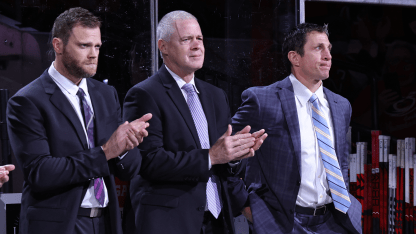
All the little threads that go into a hire like this one. First, you have to believe it's the right move and then for Gleason, he had to believe it was the right move and not just for himself, but for his family who had become used to having him around. Especially with his son in youth hockey and girls busy with horses and art.
"I think being able to do it, I was 100 percent in. It was an opportunity that doesn't necessarily come around very often," Gleason said. "The hesitation was knowing the amount of time involved. Because playing is one thing, coaching is another. I guess you don't really notice that until you're actually doing it. It was more of a family decision, just making sure that the wife and kids are on board because if they're not then whatever."
"It was more like, 'hey, this is what it is and I'm not going to be around a lot,' and things like that. For the kids it's obviously a bigger adjustment just because I was home for a long time," Gleason added. "It was almost six years I was home, really even with the other job. And then you're not. So it was a big adjustment, but it's all come around full circle."
Brind'Amour, as is his want, is candid about his expectations, especially early on in having Gleason take on the assistant coaching role.
"He's been great. He's been way better than I thought," Brind'Amour said. "Knowing the game is going to help you coach, but it's a different animal when you get into what actually goes on. All the details, he's picked it up so quickly and effortlessly really. Pleasantly surprising for me."
Brind'Amour, who was an assistant coach for seven years before taking over as head coach in the summer of 2018, imagined there would be more teachable moments for Gleason.
"I literally threw him in the fire and said you're handling that, that and that, go. Matchups and adjusting all the things that happened, because that's the best way to learn is on the fly and he's been great about it. I've been real happy with him. Obviously we already had a relationship, we were teammates, but we were also friends so it's been good," Brind'Amour said.
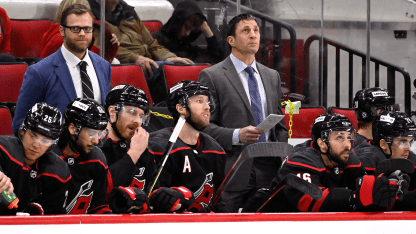
While Gleason was at ease talking to players and sharing ideas with them from his days in development, he was brand new at presenting to the group and breaking down video with a larger group, and making sure that those sessions were properly planned and laid out.
This isn't a university lecture where a professor drones on for an hour on a topic. This is about quickly passing along crucial bits of information about a defensive alignment or a penalty kill face-off set-up and the information has to be succinctly presented for it to have its desired effect.
"With the meetings, it was more making sure you're being detailed, especially with things that are new. Because as a player you're like, oh yeah, give me one job I'll do it," Gleason said. "Coaching you've got to maybe explain four or five different jobs. Things like that. That was an adjustment and it continues to be something that you try to get better at."
One of the first things Gleason did when he got the job, along with meeting with Brind'Amour and the rest of the coaching staff, was to reach out to the players, the defensemen primarily, who would be his responsibility and discuss his vision of what the relationship would be like between he and the players.
"Tim was great. He called us all when he got the job. Introduced himself," said veteran defenseman Ian Cole, a two-time Stanley Cup winner who signed with Carolina last offseason. "He was upfront about it, like listen, I'll be honest with you, I don't really know what I'm doing. I have an idea of what I should do. I have an idea of what I want to do, but I've never done it before. I don't have that experience. So it's one of those things where I'm going to grow as a coach along as we grow as a team and as players and guys, talk to me and let me know what's going on. Let me know what you need from me. Let me know how best to communicate with you or whether you want to watch video or not watch video. Whatever."
"He was very malleable in the sense as a coach where he wasn't set in his ways, well this is how I do things and this is how you need to do things if I'm going to be your coach," Cole added. "Which I think is great."
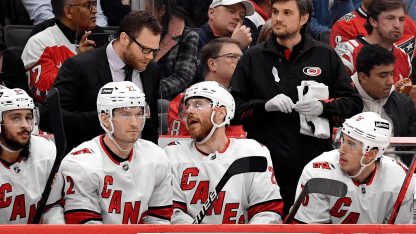
In some ways Gleason and Brind'Amour, like all of the coaching staff that includes goaltending coach Paul Schonfelder, veteran video coach Chris Huffine and another former Hurricane and longtime coach Jeff Daniels, are attached at the hip.
It's not just the amount of time often spent in the cramped quarters of the coaches' office where the group gathers on a daily basis, including the moments after every game, but the symbiotic nature of their relationship, each with a specific task that is intricately related to the tasks of the others. And while the buck always stops with Brind'Amour on everything from lineup decisions to scheme to practice schedules, there is an obvious level of trust within the coaching group. Brind'Amour explained that one of his coaching philosophies is not to duplicate work. So he assigns tasks and doesn't micromanage. There is open discussion about topics from the staff.
"I think that's why things go fairly smoothly," Gleason said. "Four minds are better than one in my opinion. For example, from the PK standpoint, that's an enormous deal so there's a lot of discussion with the guys in the room. I ask Huff a lot of things, too. He's the brains behind the brain, he's the man, right? But it's very helpful because one guy sees it one way you might see it another way. It works well like that. I think it's a huge thing that Roddy gives us opportunity to do our jobs but at the same time, hey maybe try this maybe try that or vise versa so it works really well."
It's definitely not the same everywhere around the NHL. In fact, it might be the opposite in some coaches' rooms.
"Hey, believe it or not, we have some laughs in there even though a lot of times you come in here and nobody speaks in here," Gleason said with a laugh. "But we talk all the time. There are a lot of good conversations. You throw the odd joke around and boys will be boys kind of thing, but when it's time it's time."
Gleason jokes that it's easy to have a conversation about how this has all unfolded given that, well, he didn't suck at his job and the team didn't suck either.
"I guess it helps that things were going well," Gleason said. "I couldn't say differently if it went south, I don't know if I'd be saying the same type of thing. So I think it's very helpful that I came into a good setting, a very good team and coaching staff and management and things like that. So you're kind of ahead of the game right off the hop."
While we joke about Gleason's stoicism on the bench it kind of fits how he played the game. No nonsense. No frills. But it's a job he's warmed to quickly and the job has warmed to him.
"Well it's definitely the closest thing to playing. So that's a good feeling on its own. I think what I get excited about is conversations with the players on the bench; listening to them, seeing how they're feeling, some guys are frustrated, some guys aren't, see how individuals are and you kind of learn to understand a little bit better. And I think that's a very fun but challenging thing at the same time to really see how they're adapting throughout the game. The crowd's involved and your emotions are through the roof," Gleason said.
Whether you're protecting a late lead or pushing for a late tying or winning goal, the emotions are intense and the coaches have to convey information at critical times that will give those players the best chance at success just as the other teams' coaches are trying to do exactly the same thing across the ice.
"There's a lot of high, intense moments and I've got to tell you as a player it's somewhat stressful in a different way, but as an assistant coach it's a totally different level of stress or mindset," Gleason said. "The mentality's totally different. By the end of it I sleep like a baby now and I couldn't sleep before when I played. I don't know what it is. You don't have control over it, but you know that there's a lot of things that go into it. It's definitely a great high. Being out there with the players, especially if you talk to a certain player prior about trying to work on something and they go do it that's what it's all about. It's just helping the player, being there for the player."
So, you go with your gut in making a critical hire. No guarantees it'll work out the way you planned or even hoped. But isn't that the way with any NHL team? You don't know until you know about any of it, how managers, scouts, coaches, players, will all fit.
And Brind'Amour has always followed his own hockey compass since taking over as head coach and it has consistently found true north. As it did with Gleason.
"I always said about this, we hire good people and they'll figure it out. I'd rather have that than, oh a guy who's coached forever and is not a good person. That's not going to work," Brind'Amour said. "So, let's go start with the guy who knows. I'm a big advocate of guys that have played. I just am because they've sat there. They sat there and they know exactly how that guy's thinking because they've been through it. Jeff Daniels. That was my first hire because I knew he'd done everything; he's been a coach at every level, and he's been with our organization forever so he knows the guys. It was easy. This was the easiest hire ever. Tim was like just sitting there. Just perfect timing for him. I love the fact that he's a Hurricane."
Worth A Click:
Canes Announce 2022 Prospects Development Showcase Schedule
Season In Review: The Goaltenders
Season In Review: The Forwards
NHL Reveals Official 2023 Stadium Series Logo
CanesCast Episode 215: This Episode Needs A Title
Key 2022 Offseason Dates
Vibrant Canes Mural Completed In Downtown Raleigh
Photos of the Season: Best Celebrations
Canes STMs Leave Their Mark At Paint The Ice Event
Canes End Of Season Media Availability Videos
Canes Contract Tracker


